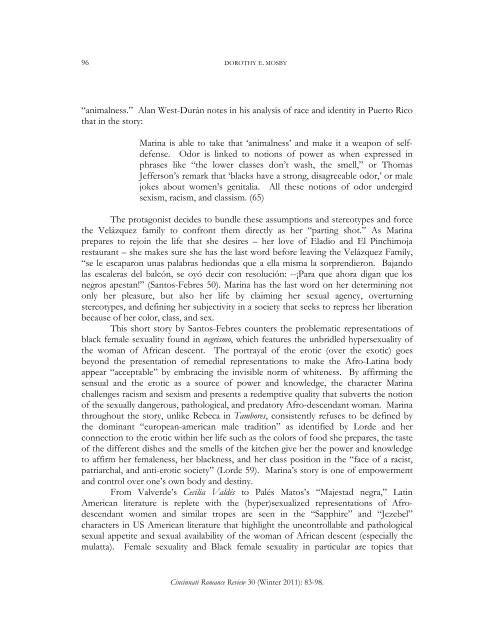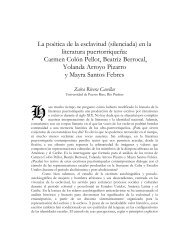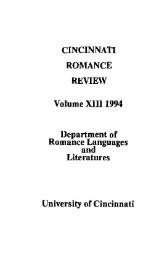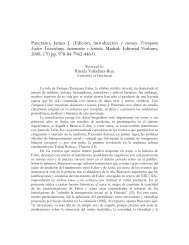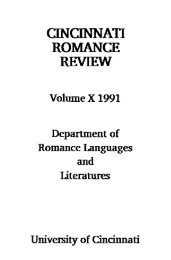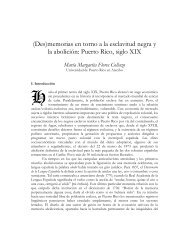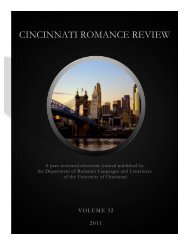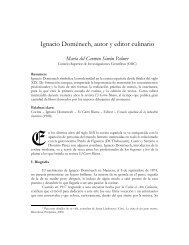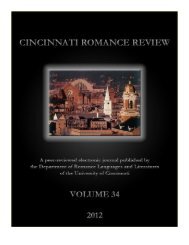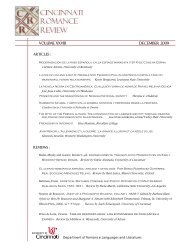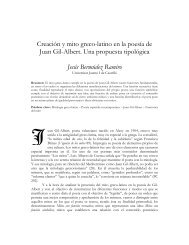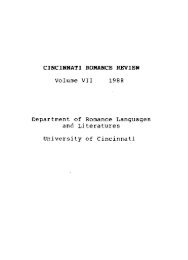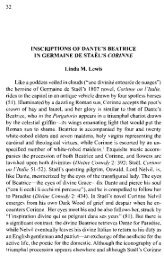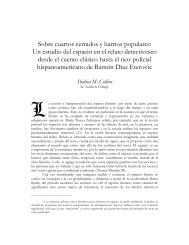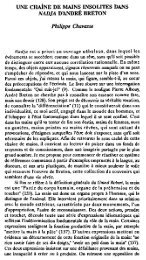Volume 30 (2011) - Cincinnati Romance Review
Volume 30 (2011) - Cincinnati Romance Review
Volume 30 (2011) - Cincinnati Romance Review
You also want an ePaper? Increase the reach of your titles
YUMPU automatically turns print PDFs into web optimized ePapers that Google loves.
96 DOROTHY E. MOSBY<br />
“animalness.” Alan West-Durán notes in his analysis of race and identity in Puerto Rico<br />
that in the story:<br />
Marina is able to take that ‘animalness’ and make it a weapon of selfdefense.<br />
Odor is linked to notions of power as when expressed in<br />
phrases like “the lower classes don’t wash, the smell,” or Thomas<br />
Jefferson’s remark that ‘blacks have a strong, disagreeable odor,’ or male<br />
jokes about women’s genitalia. All these notions of odor undergird<br />
sexism, racism, and classism. (65)<br />
The protagonist decides to bundle these assumptions and stereotypes and force<br />
the Velázquez family to confront them directly as her “parting shot.” As Marina<br />
prepares to rejoin the life that she desires – her love of Eladio and El Pinchimoja<br />
restaurant – she makes sure she has the last word before leaving the Velázquez Family,<br />
“se le escaparon unas palabras hediondas que a ella misma la sorprendieron. Bajando<br />
las escaleras del balcón, se oyó decir con resolución: --¡Para que ahora digan que los<br />
negros apestan!” (Santos-Febres 50). Marina has the last word on her determining not<br />
only her pleasure, but also her life by claiming her sexual agency, overturning<br />
stereotypes, and defining her subjectivity in a society that seeks to repress her liberation<br />
because of her color, class, and sex.<br />
This short story by Santos-Febres counters the problematic representations of<br />
black female sexuality found in negrismo, which features the unbridled hypersexuality of<br />
the woman of African descent. The portrayal of the erotic (over the exotic) goes<br />
beyond the presentation of remedial representations to make the Afro-Latina body<br />
appear “acceptable” by embracing the invisible norm of whiteness. By affirming the<br />
sensual and the erotic as a source of power and knowledge, the character Marina<br />
challenges racism and sexism and presents a redemptive quality that subverts the notion<br />
of the sexually dangerous, pathological, and predatory Afro-descendant woman. Marina<br />
throughout the story, unlike Rebeca in Tambores, consistently refuses to be defined by<br />
the dominant “european-american male tradition” as identified by Lorde and her<br />
connection to the erotic within her life such as the colors of food she prepares, the taste<br />
of the different dishes and the smells of the kitchen give her the power and knowledge<br />
to affirm her femaleness, her blackness, and her class position in the “face of a racist,<br />
patriarchal, and anti-erotic society” (Lorde 59). Marina’s story is one of empowerment<br />
and control over one’s own body and destiny.<br />
From Valverde’s Cecilia Valdés to Palés Matos’s “Majestad negra,” Latin<br />
American literature is replete with the (hyper)sexualized representations of Afrodescendant<br />
women and similar tropes are seen in the “Sapphire” and “Jezebel”<br />
characters in US American literature that highlight the uncontrollable and pathological<br />
sexual appetite and sexual availability of the woman of African descent (especially the<br />
mulatta). Female sexuality and Black female sexuality in particular are topics that<br />
<strong>Cincinnati</strong> <strong>Romance</strong> <strong>Review</strong> <strong>30</strong> (Winter <strong>2011</strong>): 83-98.


